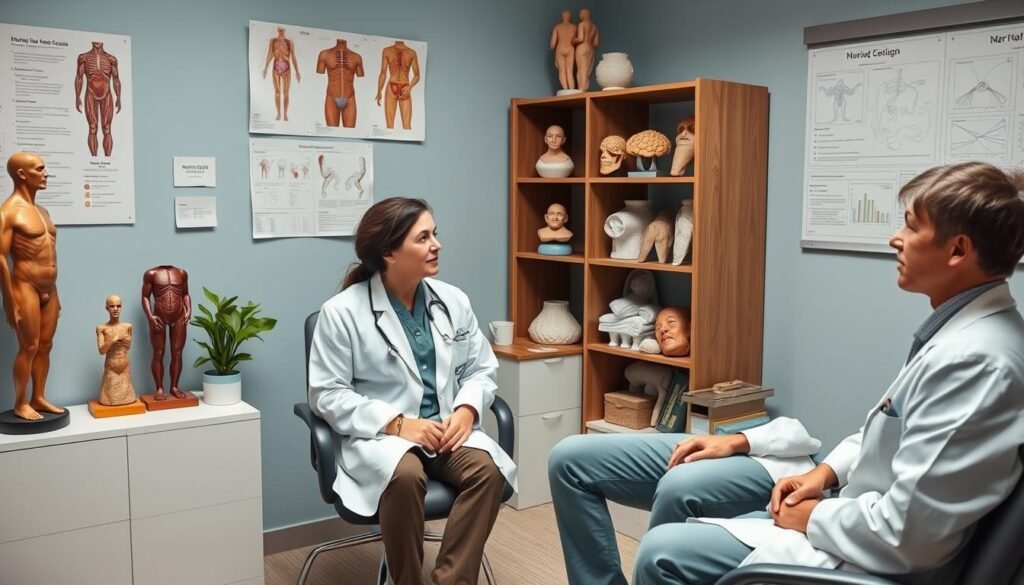Almost 2.5 million Americans live with Chronic Fatigue Syndrome (CFS), according to the Institute of Medicine. This condition is known for causing extreme tiredness that doesn’t get better with rest. Finding the right specialist is key to managing and treating this fatigue effectively.
Rheumatologists, neurologists, and other healthcare professionals are important in this fight. They help diagnose and manage CFS. Their support offers patients relief and a path towards feeling better.
If you’re dealing with chronic fatigue, it’s a good idea to see a specialist. They offer personalized care and different treatment options. Their support can make a big difference in your recovery and overall health.
Key Takeaways
- Chronic Fatigue Syndrome affects approximately 2.5 million people in the U.S.
- Specialists like rheumatologists and neurologists are essential for diagnosis and treatment.
- Understanding health history is crucial for accurate assessment and care.
- Keeping an activity journal can help track symptoms effectively.
- No specific screening test is currently available for CFS.
Understanding Chronic Fatigue Syndrome (CFS)
Chronic Fatigue Syndrome, also known as Myalgic Encephalomyelitis, is a complex illness. It features extreme fatigue lasting six months or more. This kind of fatigue doesn’t get better with rest and can greatly affect daily life.
People with this condition might see their energy levels go up and down. This can greatly impact their mental and physical abilities.
The exact causes of Chronic Fatigue Syndrome are still unknown. It seems to involve biological, genetic and environmental factors. Things like viral infections and immune system issues might trigger it. It’s estimated that about 1% of adults in the U.S. have this condition. It’s more common in young adults, ages 20 to 40. Also, it is seen more often in women than in men.
Dealing with Chronic Fatigue Syndrome means finding ways to manage the fatigue. This could include medical treatments or lifestyle changes to better one’s life. Many who have this condition haven’t been diagnosed yet. This shows the need for better awareness and recognition by doctors.
| Statistic | Data |
|---|---|
| Prevalence in General Population | 0.007% to 2.5% |
| Prevalence in Primary Care Patients | 0.5% to 2.5% |
| Estimated Cases in the U.S. | Up to 2.5 million |
| Gender Prevalence | 2-3 times more common in women |
| Common Age Group Affecte | 20 to 40 years old |
| Estimated Adult Population with CFS (U.S.) | 1% |
Symptoms and Causes of Chronic Fatigue
Chronic Fatigue Syndrome (CFS) has a big impact on daily life. It’s marked by intense tiredness that doesn’t go away for at least six months. People also feel muscle and joint pain, struggle with memory, and have headaches. Post-exertional malaise is common too. This means minor activities can make their fatigue worse and cause more pain.
The reasons behind CFS are not simple. Some research points to viral infections like the Epstein-Barr virus as triggers. Problems with the immune system are also key. This includes ongoing inflammation and weaker natural killer (NK) cells.
Hormone imbalances play a role too, especially in the HPA axis which could keep the fatigue going. Genetics also matter. A family history of CFS or certain gene variants can raise your risk.
CFS is found more often in women than men. They are three to four times more likely to get it. It usually starts between the ages of 20 and 45. That’s why it’s critical to spot and manage chronic fatigue symptoms early.
To learn more about chronic fatigue syndrome, check out this detailed resource.

Rheumatologists, Neurologists, and Other Specialists Who Treat Chronic Fatigue
Many experts team up to tackle chronic fatigue effectively. Different specialists craft care plans based on each patient’s needs. Rheumatologists work with neurologists and others. They ensure those with chronic fatigue syndrome (CFS) get well-rounded care.
The Role of Rheumatologists in Managing Chronic Fatigue
Rheumatologists deal with autoimmune disorders that can lead to chronic fatigue. They explore how conditions like fibromyalgia relate to CFS. Their skills help decide on treatment, whether with medicine or other approaches. Around 5% of people in the UK have fibromyalgia. This statistic shows why rheumatologists are key in managing chronic fatigue, spotting autoimmune issues.
Neurologists and Their Expertise in Fatigue Management
Neurologists play a big role in managing chronic fatigue. They look into how it affects the brain, pain, and sleep. Understanding the link between the nervous system and fatigue is their goal. Their specialized care often makes life better for patients.
Other Specialists Involved in Chronic Fatigue Treatment
A lot of specialists join forces to address chronic fatigue. Infectious disease experts, psychologists, and sleep doctors offer comprehensive care. They look at both physical and mental aspects of the condition. This team approach leads to better health. Sadly, about 91% of people with myalgic encephalomyelitis/chronic fatigue syndrome (ME/CFS) aren’t diagnosed. This shows how crucial it is to have experts from different fields assess the condition. Learn more about how these specialists work together at fibromyalgia management or on chronic fatigue syndrome at this site.

Diagnosis of Chronic Fatigue Syndrome
Getting diagnosed with chronic fatigue starts with understanding the rules set by medical groups. To begin, doctors gather your health history and do a full check-up. It’s important they know CFS symptoms are different from other similar conditions. Things like age, gender, and health background can change how symptoms appear.
Criteria for Diagnosis
For a CFS diagnosis, you must have had severe fatigue and other symptoms for at least six months, based on the 2015 Institute of Medicine’s report. These symptoms really get in the way of everyday life. You might feel things like:
- Being really tired after physical or mental activities
- Problems with remembering things or focusing
- Pain in muscles and joints that stays around
- Feeling tired even after sleeping
- Swollen lymph nodes
- Headaches and feeling dizzy
The rules for diagnosing CFS stress the importance of noting how long and how bad symptoms are. This helps experts figure out the best way to help you.
Tests and Evaluations Needed by Specialists
After checking you over, specialists may run tests to rule out other health problems. These tests can look at things like:
- Blood tests for problems with body salts
- Checking how your thyroid is working
- Using X-rays and other scans to look for health issues
The results from these tests help doctors confirm if you have chronic fatigue. They can then plan how to help you best. Keeping a journal of your activities and symptoms is a good idea. It helps doctors understand your condition better.

How to Find Specialists Near You
Finding the right specialists for Chronic Fatigue Syndrome (CFS) can seem hard. But using physician databases and other tools can help a lot. These resources help you find quality care that meets your needs.
With these tools, you can find healthcare providers who understand CFS well. They can help improve your health and well-being.
Utilizing Physician and Clinic Databases
Physician databases are key for patients who need chronic fatigue experts. They list many healthcare pros, like rheumatologists and neurologists. These databases also have patient reviews, which help you choose based on others’ experiences.
Chronic fatigue clinics are also in these databases. They give details about their services. This info helps find experts with good outcomes in CFS treatment. You can search by location to find help nearby.
Online Resources for Finding Specialists
There are many online places to find chronic fatigue specialists. Sites like Phoenix Rising Forums and ME Action have directories. They list healthcare professionals and offer a community for sharing tips and advice.
Hospitals and medical centers also keep lists of specialists. These can lead you to clinics that offer full treatment programs. Using these resources actively can make finding the right care easier.
Treatment Options for Chronic Fatigue Syndrome
Managing chronic fatigue syndrome (CFS) involves a comprehensive strategy. It aims at easing symptoms and boosting well-being. This includes medications and therapies, along with lifestyle changes. These adjustments help people deal with their daily challenges.
Medications for Managing Symptoms
Medications are key in treating CFS symptoms. Many patients experience muscle and joint pain. Relief often comes from acetaminophen, aspirin, or ibuprofen. Antidepressants may also help, especially if depression is present. Yet, it’s important to use them carefully due to possible side effects.
Therapies and Lifestyle Modifications
Therapies can significantly aid in recovery. Focusing on post-exertional malaise (PEM) in care improves patient satisfaction. Balancing activity and rest is vital in daily life. For some, using organizers and digital tools eases memory issues.
Exploring graded exercise therapy (GET) and activity management (AM) benefits physical health. These approaches help find what works best for each person.
Merging medications, therapies, and lifestyle changes forms an effective plan for CFS. For more on chronic fatigue treatments, visit Mount Sinai Health Library.
Living with Chronic Fatigue Syndrome
Dealing with chronic fatigue is a tough journey. It needs plans that fit each person’s life. To cope, it’s key to have a balanced daily plan. This includes resting at times between tasks. Doing so stops symptoms from getting worse. This helps save energy.
Daily Management Strategies
To fight the effects of CFS, try these tips:
- Activity pacing: Do things at an easy pace to avoid feeling worse after.
- Routine establishment: A regular day-to-day schedule helps things feel normal.
- Prioritizing tasks: Handle important tasks first and delay others to reduce stress.
- Rest areas: Set up rest spots at home to take breaks when tired.
- Mindfulness practices: Using relaxation methods can make overall health better.
Support and Counseling for Patients
Getting the right support is essential for CFS patients. Talking with therapists who know about chronic illnesses can give important help. Being part of group therapy or support groups helps a lot. These groups let people share stories and build strength together. They create a community that gets what living with chronic fatigue is like.
Conclusion
Dealing with Chronic Fatigue Syndrome takes a team effort. This includes experts in the condition, different treatments, and support. Research, like the NIH study, shows how complex this illness is. It affects men and women in unique ways. With quick diagnosis and tailored treatments, doctors can help people take back their lives.
Knowing about chronic fatigue and getting expert care is essential. Over time, research and feedback have created helpful programs and tips. Both doctors and patients working together lead to better health.
If you’re dealing with chronic fatigue, it’s important to seek help and look into all treatment options. Taking this step helps patients get out of isolation. It improves their life quality. This empowers them to better manage their health journey.